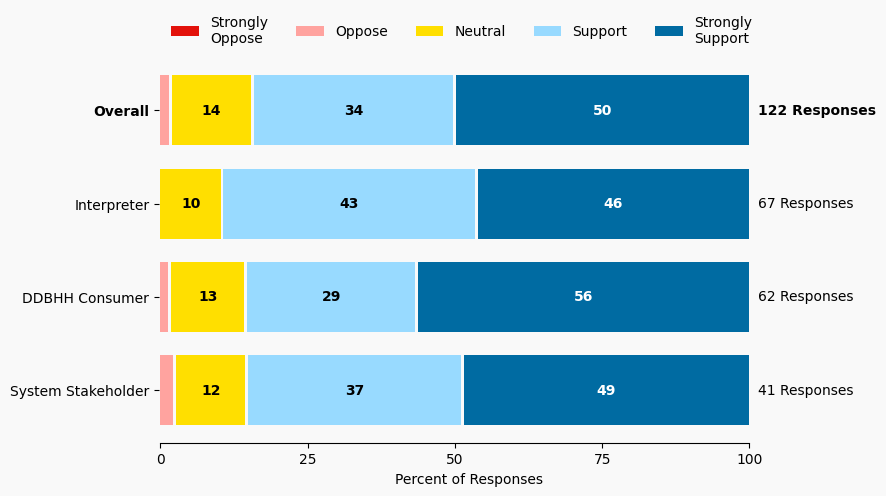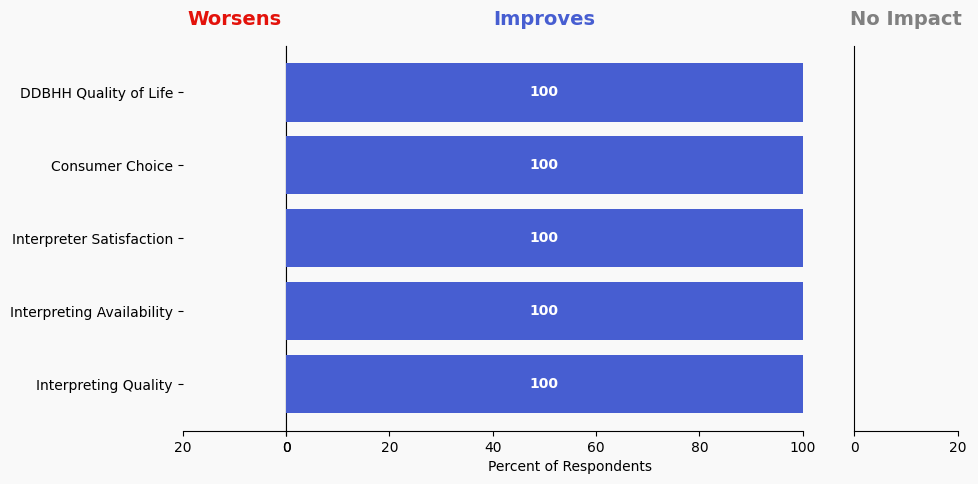78 Increase Compensation for Medical and Mental Health Qualifications
Issue: Interpreters who have received additional training are not compensated more for medical nor mental health appointments.
Proposed Solution: Interpreters develop their contracts with interpreter referral companies and other hiring entities to compensate additionally when demonstrating qualifications in the areas of medical (RIT’s medical specialty masters, BEI’s medical certificate, or equivalent) or mental health interpreting (QMHI). This added compensation is intended only when interpreting in medical or mental health related assignments.
Expected outcome: Higher retention of more qualified interpreters in these specialty areas.
Who is impacted: Interpreters
Timeline: 6 months

Summary of Support Image Description
The stacked bar charts show how respondents rated their level of support and the total number of responses. The percentage for the five support levels is shown from left to right: Strongly Oppose (Dark Red), Oppose (Light Red), Neutral (Yellow), Support (Light Blue), and Strongly Support (Dark Blue).
Respondents may identify with multiple subgroups. The overall level of support is:
Overall
Strongly Oppose: 0%
Oppose: 2%
Neutral: 14%
Support: 34%
Strongly Support: 50%
Click to see the detailed image description for each subgroup.
Interpreter
Strongly Oppose: 0%
Oppose: 0%
Neutral: 10%
Support: 43%
Strongly Support: 46%
DDBHH Consumer
Strongly Oppose: 0%
Oppose: 2%
Neutral: 13%
Support: 28%
Strongly Support: 56%
System Stakeholder
Strongly Oppose: 0%
Oppose: 2%
Neutral: 12%
Support: 37%
Strongly Support: 49%
Overview of Respondents Opting for In-Depth Solution Analysis
After indicating their support level, 2% of the 122 respondents opted in to further assess whether the solution would worsen or improve on five metrics. Of the opt-in reviewers (3 respondents), 66% supported the solution, 0% were neutral on the solution, and 33% opposed the solution.
The remaining 119 respondents did not opt in to further assess the solution. Of these people, 84% support the solution, 14% were neutral on the solution, and 0% opposed the solution.
Reviewer Evaluation of Solution Effectiveness

Solution Effectiveness Image Description
The stacked bar charts show how respondents assessed the effectiveness of this solution based on five metrics. For each metric, the percentage of respondents is shown from left to right: Worsens (Red), Improves (Blue), No Impact (Gray).
DDBHH Quality of Life
Makes It Worse 0%
Makes It Better 100%
No Impact 0%
Interpreter Satisfaction
Makes It Worse 0%
Makes It Better 100%
No Impact 0%
Consumer Choice
Makes It Worse 0%
Makes It Better 100%
No Impact 0%
Interpreting Availability
Makes It Worse 0%
Makes It Better 100%
No Impact 0%
Interpreting Quality
Makes It Worse 0%
Makes It Better 100%
No Impact 0%
Reviewer Feedback and Insights
Interpreter
Comments from Interpreters agree with increasing interpreting service rates to help offset the cost of paying interpreters with specialized qualifications. One comment questions whether BEI could be recognized as a qualification in Minnesota.
Deaf, DeafBlind, Hard of Hearing
Comments from DDBHH Consumers agree with increasing interpreting service rates to cover the cost of compensating interpreters with medical and mental health qualifications.
System Stakeholder
Comments from System stakeholders provide support for increasing specialized interpreting service rates.
PREVIOUS SOLUTION
77 Increase Number of Qualified Mental Health Interpreters via Grant Funding
Issue: Consumers do not have enough access to interpreters for mental health services. Time and funds to attain a Qualified Mental Health Interpreter (QMHI) Certification are a challenge for many working interpreters. Minnesota has only two QMHI Supervisors.
NEXT SOLUTION
79 Strengthen Joint Health Commission’s Standards for Provider Accountability and Patient Choice
Issue: The culture and language standards of the Joint Health Commission are not strong or detailed enough to provide protections and best practices for DDBHH patients to have full communication access.
Leave a Reply